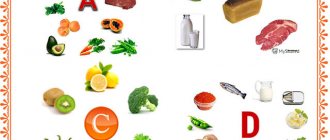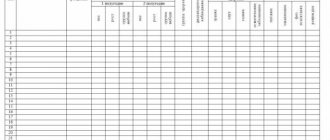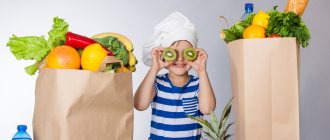Proper nutrition is the key to the health of preschool children
Among the many different factors that constantly affect the development of a child’s body and its health, nutrition plays the most important role. The nature of nutrition in early childhood leaves an imprint and influences the further development of the child and his state of health not only in childhood and adolescence, but also in adulthood.
What is meant by proper nutrition and what should it be like for a preschool child?
Proper or rational nutrition is a diet that strengthens and improves a person’s health, physical and spiritual strength, and prevents and treats diseases. In short, proper nutrition is healthy eating.
The nutrition of a preschool child should be:
Firstly, it is complete , containing proteins, fats, carbohydrates, minerals, vitamins, and water in the required quantities.
Secondly, varied , consisting of products of plant and animal origin. The more diverse the set of products included in the menu, the more fully the need for food is satisfied.
Thirdly, benign - do not contain harmful impurities and pathogenic microbes. Food should not only be tasty, but also safe.
Fourthly, it is sufficient in volume and calorie content to induce a feeling of satiety. The nutrition a preschooler receives must not only cover the energy he expends, but also provide the material necessary for the growth and development of the body.
Characteristics of the main food components
Proteins are of particular importance, since without them the basic elements of organs and tissues cannot be built. They cannot be replaced by other nutrients.
Sources of protein include meat, fish, milk and dairy products, eggs (animal proteins), as well as bread, cereals, legumes and vegetables (vegetable proteins). Lack of protein in a child's diet not only slows down normal growth and development, but also affects brain function and the functioning of the body's immune system. Therefore, proteins should be constantly included in the diet of preschoolers and schoolchildren.
Fats are a source of energy, take part in metabolism, and contribute to the development of immunity. Sources of fats are butter and vegetable oil, cream, milk, dairy products (sour cream, cottage cheese, cheese), as well as meat, fish, etc.
Carbohydrates are the main source of energy and promote the absorption of proteins and fats in the body. Contained in beet, cane sugar, honey, berries, fruits. They are quickly absorbed in the body and help maintain blood sugar. Complex carbohydrates are found in flour, potatoes, and vegetables in the form of starch.
Excessive amounts of carbohydrates lead to metabolic disorders.
Water is of great importance in the diet, since without it life processes cannot occur. A child needs about one and a half liters of water per day.
Mineral salts and trace elements are building materials for organs, tissues, cells and their components. Ensuring their intake into the body is especially important during the period of active growth and development of the child.
Minerals are divided into two groups depending on their content in the body: macroelements, or mineral salts (sodium, potassium, calcium, phosphorus, magnesium, chlorides, sulfates, etc.) and microelements (iron, copper, zinc, chromium, manganese, iodine , fluorine, selenium, etc.). The content of macroelements in the body can be up to 1 kg. Microelements do not exceed tens or hundreds of milligrams. The greatest amount of trace elements and minerals is contained in the following products:
- calcium and phosphorus - in milk and fermented milk products, fish, eggs, legumes;
- magnesium - in various cereals (bread, cereals, legumes);
- iron - in liver (pork and beef), oatmeal, peaches, egg yolk, fish, apples, herbs, raisins.
Vitamins - your daily diet should contain sufficient amounts of all vitamins. Vitamins are necessary for the normal course of biochemical reactions in the body, absorption of nutrients, growth and restoration of cells and tissues. Vegetables, fruits, and berries are a rich source of mineral salts and vitamins. However, during cooking, these substances are largely lost. Therefore, children should be given more raw vegetables, fruits and berries and enrich ready-made meals with vitamins by adding raw juices and herbs to them.
Catering, diet, regime and sample menu
In accordance with the principles of organizing nutrition for preschool children, the diet should include all main food groups.
For meat, it is preferable to use lean beef or veal, chicken or turkey. Less healthy are sausages, frankfurters and small sausages. By-products serve as a source of protein, iron, and a number of vitamins and can be used in children's nutrition.
Recommended fish varieties: cod, pollock, hake, pike perch and other low-fat varieties. It is recommended to include salted fish delicacies and canned food in the diet only occasionally.
Milk and dairy products occupy a special place in children's nutrition. It is a rich source of easily digestible protein, calcium, phosphorus and vitamin B2.
Fruits, vegetables, fruit and vegetable juices contain carbohydrates (sugars), some vitamins, microelements, as well as useful substances such as pectin, fiber, dietary fiber and others. These products improve the functioning of the digestive system and prevent constipation.
Bread, pasta, cereals, vegetable and animal fats, especially buckwheat and oatmeal, are needed. Vegetable oil as a seasoning for salads allows the absorption of many beneficial substances contained in vegetables.
In total per day, a child 4-6 years old should receive: proteins and fats about 70 g, carbohydrates about 280 g, calcium 900 mg, phosphorus 1350 mg, magnesium 200 mg, iron 12 mg, zinc 10 mg, iodine 0.08 mg, vitamin "C" 50 mg. The intervals between meals should be no more than 3.5-4 hours.
An important condition is a strict diet, which includes at least 4 meals. Moreover, 3 of them must include a hot dish. At the same time, breakfast accounts for approximately 25% of the daily calorie content, lunch - 40%, afternoon snack - 15%, dinner - 20%.
| Breakfast | The child should be given porridge, egg or cottage cheese dishes, meat, fish, tea or coffee drink with milk, bread and butter, cheese. |
| Dinner | must contain a vegetable salad, meat, chicken or fish broth with vegetables, cereals, a second course of meat, poultry or fish with a side dish and dessert in the form of jelly, compote, drink, fresh fruits or berries, fruit puree. |
| Afternoon snack | the child should drink a glass of milk, kefir or yogurt, eat cookies, cheesecake or buns, and fruit. |
| Dinner | It is better to give vegetable or cereal dishes depending on breakfast; meat and fish dishes, especially fried ones, should not be given. |
At the same time, some foods are extremely undesirable in the diet of a preschooler. Not recommended: smoked sausages, canned food, fatty meats, some spices: pepper, mustard and other hot seasonings. To improve the taste, it is better to add parsley, dill, celery, green or onions, and garlic to your food. The latter, in addition, have the ability to inhibit the growth of pathogenic microbes. The taste of food can be significantly improved if you use some sour juices (lemon, cranberry), as well as dried fruits
For drinks, it is preferable to drink weak tea with milk, coffee drink with milk, juices, and rosehip decoction. It is necessary to exclude any carbonated drinks from the diet of preschoolers. Pastille, marshmallows, marmalade, honey, jam, preserves are recommended as sweets.
The results of assessing the quality of nutrition of preschool children and blitz surveys of parents show that many children do not receive enough iodized salt, milk and fermented milk products, fish and fish products, meat and meat products in their daily diet. But the daily consumption of confectionery and bakery products makes up 80% of the total diet.
Often children prefer to eat pizza and chips instead of porridge; instead of hot dishes of meat and fish - sausages and sausages. Children do not want to eat what is healthy and necessary for their health, and parents often indulge them in this and do not always care about organizing proper and rational nutrition for their children at home.
Recommendations for parents on nutrition for young children
Proper nutrition of a preschooler depends entirely on the parents.
First of all , you need to know and remember that the nutrition of a preschool child should differ markedly from the diet of its parents.
Heat treatment of foods by frying is undesirable; it is better to steam or bake foods.
The daily menu of a preschooler should not contain dishes that are similar in composition. For example, if porridge is offered for breakfast, then it is better to give a vegetable dish for dinner.
If your child attends kindergarten, where he receives age-appropriate meals four times a day, then the homemade diet should complement, and not replace, the kindergarten diet. For this purpose, parents, having familiarized themselves with the menu, at home should give the baby exactly those products and dishes that he did not receive during the day.
It is better to exclude breakfast before kindergarten, otherwise the child will have a bad breakfast in the group. As a last resort, you can give him kefir to drink or an apple. On weekends and holidays, it is better to stick to the kindergarten menu.
When your child is 3 years old, it’s time to start teaching him proper table manners.
- The child should sit straight , without leaning his elbows on the table while eating, without spreading them wide to the sides. Know how to use a spoon correctly.
- When using a table knife , hold it in your right hand and the fork in your left. Adults should teach the child not to cut the entire portion at once, but after cutting off a piece, eat it and only then cut off the next one.
- It is necessary for the baby to develop the habit of chewing slowly, with his mouth closed. If he has a poor appetite, it is unacceptable to entertain him while he eats, allow him to watch TV, or promise a reward for eating everything. Such rewards disrupt the digestive process and do not improve appetite at all.
- Eat in a calm state (this doesn’t just apply to six-year-olds!). It is necessary to avoid quarrels and unpleasant conversations at the table - this also worsens the digestion process and reduces appetite.
- You should not give your baby more food than he can eat. It’s better to add a little extra later.
- The kid should know that you can leave the table after finishing the meal only with the permission of the elder (but, of course, not with a piece of bread or other food in your hands). He must thank those present, push in a chair, put away the dishes, wash his hands (the same as before eating) and rinse his mouth.
Remember! A child will very quickly learn all these rules if he has an adult example before his eyes.
Following these recommendations will help your child grow up healthy.
Nutrition for a pregnant woman
So, your plans and decisions to have a baby have come true - you are pregnant! But this news gives you a double feeling: on the one hand, a feeling of joy, and on the other, a feeling of certain apprehension and even fear of unknown trials for your life and the fate of the unborn baby. What will it be like? - healthy, beautiful, happy?...
And this largely depends on the woman herself, on what kind of life she will lead during pregnancy and, most importantly, how she will eat.
A woman’s diet during different periods of pregnancy
The main thing on the expectant mother's menu is variety . She should eat foods from all food groups: meat, fish, vegetables and fruits, dairy products, bread and cereals.
A woman’s diet during pregnancy can be divided into three periods (trimesters).
If before pregnancy a woman ate normally, felt comfortable, and did not experience allergies to any foods, then at the early stage of the first trimester of pregnancy there is no need to change her diet.
During this period, all organs and systems in the child’s body are formed, tissues are formed. The body needs complete proteins and vitamins: lean meat (rabbit, chicken, turkey), fish and seafood, dairy products. Be sure to eat rice, fresh or frozen vegetables, and seasonal fruits. In the first trimester, many expectant mothers are still working. No matter how difficult it is to control your diet in a work environment, you need to do it - find time for a full breakfast and lunch.
In the first trimester of pregnancy, the body undergoes active restructuring and adaptation to a new state . During this period, it is recommended to switch to a low-calorie diet, including more fruits, juices, and decoctions of dried fruits, including rose hips. At the very beginning of pregnancy, especially if toxicosis is tormented, more frequent, but less heavy meals are recommended.
Always have a hematogen in your pocket, a bag of nuts or dried fruits for a snack on the street. If your condition does not allow you to eat regular food, you should pay attention to baby food. Baby products literally save expectant mothers suffering from severe toxicosis. These are boxed cereals, children's curds, cookies and fruit purees.
In the first trimester, it is necessary to pay special attention to the quality of products. Gradually give up sauces, semi-finished products and canned food containing harmful chemical additives. Do not forget that the placenta freely accumulates and passes chemicals. Products containing folic acid are of great importance; without it, intensive metabolism is impossible; its deficiency can cause developmental abnormalities. Folic acid is found in greens, nuts, cabbage and broccoli, beets, legumes, and eggs.
According to nutritionists, the diet of pregnant women should be 300 kcal/day higher than that of non-pregnant women, but in the first trimester there is no need to increase the energy value of the diet; in the second trimester an additional 340 kcal/day is required; in the third trimester – 452 kcal/day. Pregnant women generally get enough calories, and more than 80% of women achieve or exceed their required weight gain. These extra calories benefit the fetus. An underweight woman should gain 16–20 kg throughout pregnancy, an overweight woman should gain about 7 kg, and a normal body weight woman should gain 11–12 kg.
In the second trimester , there are active changes in the growth and weight of the child and the uterus, so the calorie content of the diet must be increased. It is advisable to eat more and better. At this time, the need for microelements increases: iron, magnesium, zinc, selenium, calcium, potassium. The child creates his own “reserve” of microelements using the mother’s resource, which means that the mother should have enough for two.
Very often, in pregnant women, hemoglobin drops in the second trimester; this is a normal physiological phenomenon, if it is not threatening to health. You can increase hemoglobin by eating red meat, chicken, fish, dried fruits, pomegranates, green vegetables and fresh herbs, buckwheat, citrus fruits (oranges, grapefruits, pomelo, lemons), infusions of rose hips and berries.
In the second trimester, a pregnant woman needs to limit the consumption of smoked and fried foods, as well as salt, in her diet. Under no circumstances should fluid be restricted. Pure water is the best drink for a pregnant woman, and you should drink up to 2-2.5 liters of water per day. Water is a natural drink for the body; it does not cause complications and has no contraindications. Swelling is caused not by water, but by salt, which we not only add in its pure form, but also consume with canned food, mayonnaise, cheese, and sausage. The absence of salt is not harmful; it is naturally found in many foods: vegetables, bread, so your diet will not be completely without it. Excess salt disrupts metabolism.
During this period, you can increase the caloric content of food. You need to approach childbirth physically strong. It is better to eat meat and fish in the first half of the day, for breakfast and lunch, and for dinner prepare dairy-vegetable dishes: cheesecakes, stewed vegetables, cottage cheese and vegetable casseroles. It is necessary to minimize the intake of canned food, smoked meats, pickles and marinades, hot seasonings and fatty foods. Frequent walks in the air and physical activity are recommended.
In the third trimester, it is necessary to reduce the calorie content of foods through confectionery and flour products, eat less fatty meat, as well as cheese and sour cream.
Towards the end of this period, many experts advise pregnant women to give up meat altogether to increase tissue elasticity and prevent ruptures.
During the entire period of pregnancy, special attention should be paid to the combination of products . If you combine foods wisely, you can ensure more efficient absorption of food. If food is poorly digested, this can lead to rotting and fermentation of foods and the formation of substances harmful to the body of the mother and child. In addition, the fermentation process is accompanied by gas formation, which can lead to flatulence (bloating) and discomfort. This is especially harmful in the last stages of pregnancy.
the first, second and third courses at one time this fills the stomach and puts pressure on the fetus, food is poorly digested and poorly absorbed. Eat little and often. It is not recommended to eat food immediately before starting work, a long walk, before exercise and immediately after it; It is advisable to rest for 10 minutes before eating.
Eat only when you are hungry, try not to snack on the go. Follow a diet, eat at approximately the same time.
Proper cooking will help preserve the nutrients contained in foods as much as possible. Do not overcook foods, try not to reheat the same dish several times, it is better to set aside only the portion that will be used. Cook in the most gentle way possible: baking, steaming, stewing. Avoid frying or cooking in large amounts of water; with this method of processing food, many useful substances are lost. If possible, do not cook for several days at once. Do not use aluminum cookware when preparing food. Remember that for a pregnant woman it is not calories that are important, but the quality of food, its naturalness, first of all, “living cells” (whole grains, raw vegetables and fruits, fresh meat and dairy products).
What can harm a pregnant woman and her fetus?
Smoking and alcohol - from the first days of pregnancy, stop smoking if you have smoked before, avoid “passive” smoking, and do not drink alcoholic beverages in any doses.
Lack of vitamins and microelements in the body - their absence or deficiency can lead to irreparable consequences. For example, iodine deficiency can lead to mental retardation in a child, folic acid deficiency can lead to severe fetal deformities, calcium deficiency can lead to impaired formation of the child’s skeleton, iron deficiency can lead to anemia and delayed physical and neuropsychic development of the child. You should consult your doctor; he may recommend switching to iodized salt, as well as supplementing your diet with a vitamin-mineral complex and folic acid.
Excess weight is a risk of having a large child, which means the risk of complications during childbirth and the child’s tendency to become obese at an older age.
The use of food additives (sauces, seasonings such as vegeta, bouillon cubes), exotic fruits, semi-finished products, carbonated drinks - the risk of allergies and abnormalities in a child, unfortunately, increases from this.
Recommended for pregnant women:
- Do not eat hot dogs or other snacks containing meat that has not been heated over a fire or boiled in boiling water.
- Avoid eating soft cheeses . Hard cheeses are safe.
- Do not eat frozen pates, meat pastes, or seafood raw. Canned analogues are safe.
- Do not consume raw vegetables, unpasteurized juices, liver, meat, poultry and eggs that have not undergone sufficient heat treatment. These products may contain Salmonella taxins.
- Limit your consumption of sweets.
- Under no circumstances should you resort to fasting or various diets.
- Regularly monitor your blood pressure and do not miss visits to your gynecologist.
Remember! From your diet and lifestyle
development during pregnancy depends
Your child and his health!
Quiz healthy and harmful foods senior group
Game-quiz “Connoisseurs of proper nutrition”
for children of senior preschool age
Author:
Shagalova Elena Gennadievna, senior teacher of MBDOU d/s No. 12
Target:
To form in children the concept of a healthy lifestyle and proper nutrition.
Tasks:
1. Expand and systematize children’s knowledge about proper nutrition and healthy foods.
2. Develop your horizons and vocabulary. Develop teamwork skills and develop a sense of cooperation.
3. To instill in children a desire for a healthy lifestyle and proper nutrition.
Preliminary work:
Conversations about healthy foods, vitamins, nutritional rules. Looking at books, albums, illustrations. View presentations.
Materials and equipment:
Illustrations, multimedia equipment, oranges.
Annotation:
The work is a quiz game from the GCD cycle in valeology, which can be used as entertainment in the evening or during classes according to the M.M. program. Bezrukikh, T.A. Filippova "Talk about proper nutrition." The quiz game helps to interest children in issues of proper nutrition. Children consolidate knowledge about useful
food products, about vitamins, about the rules of healthy eating, and directly gain new knowledge on the topic. The quiz uses the most interesting, in our opinion, facts, truths, and arguments about healthy eating.
Progress:
Good afternoon, dear guys!
We do not live to eat, but we eat to live.
Let these words of the famous Socrates become the motto of our meeting today. Today we will play a game - a quiz “Connoisseurs of Proper Nutrition”. We'll have a competition and find out which team is the best nutritionist. I invite you, dear guys, to show your skills and knowledge in a game - a quiz. Together we will try to figure out what “proper nutrition” means, which foods are healthy and which pose a danger to our health. Two teams will participate in the quiz, and there will be a jury. Members of the jury will carefully monitor the answers and evaluate each task; at the end, our respected jury will sum up the results of the quiz. For each correct answer, the team will receive an orange - a symbol of victory. Whichever team has the most oranges will win. The winners will be awarded the title “Connoisseurs of Proper Nutrition”. I wish everyone good luck!
(Introduction of teams, jury)
1 competition “Milk rivers, jelly banks”
“Children, drink milk and you will be healthy!” Even oriental doctors hundreds of years ago attributed magical properties to milk. They believed that milk promotes the development of intelligence, makes a person more intelligent, helps him understand the world around him and distinguish good from evil, and this is exactly what you guys need! Therefore, in order for a child to grow up healthy, he must drink at least one glass of milk daily!
This truly unique product contains all the essential vitamins and microelements necessary for the development of a child.
1. What happens when milk sours?
- Curdled milk
- Yogurt
- Oil
2. The first food of a newborn baby
- Porridge
- Milk
- Kefir
3. Why do children need milk?
- For happiness
- For the mood
- For growth
4. What is butter obtained from?
- From the cream
- From cottage cheese
- From sour cream
5. What cold dessert, loved by children, is made from milk?
- Cottage cheese
- Ice cream
- Pudding
6. What is the name of the fermented milk drink made from mare's milk?
- Kumis
- Ryazhenka
- Kefir
2nd competition “Vegetables from the garden”
Vegetables are very healthy foods that every person needs to protect the immune system and good health, they are especially important for a growing child’s body.





